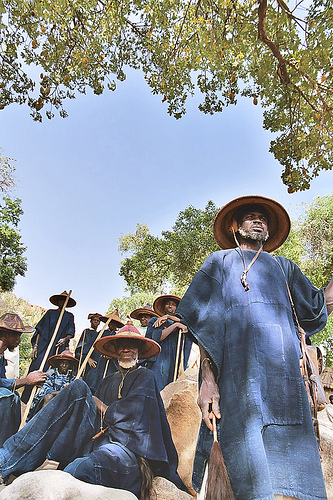Dogon #2, originally uploaded by foto_morgana.
The Dogon are an ethnic group located mainly in the administrative districts of Bandiagara and Douentza in Mal. This area is composed of three distinct topographical regions: the plain, the cliffs, and the plateau. Within these regions the Dogon population of about 300,000 is most heavily concentrated along a 200 kilometer (125 mile) stretch of escarpment called the Cliffs of Bandiagara. These sandstone cliffs run from southwest to northeast, roughly parallel to the Niger River, and attain heights up to 600 meters (2000 feet). The cliffs provide a spectacular physical setting for Dogon villages built on the sides of the escarpment. There are approximately 700 Dogon villages, most with fewer than 500 inhabitants. A Dogon family compound in the village of Pegue is seen from the top of the Bandiagara escarpment. During the hot season, the Dogon sleep on the roofs of their earthen homes. Abdule Koyo, a Dogon man, stands on the top of the Bandiagara escarpment that overlooks the Bongo plains. As the rocky land around the Bandiagara has become less and less fertile, the Dogon have moved farther from the cliffs. Millet cultivation is more productive in the fertile Bongo plains. Without any equipment but his own muscle and expertise, a Dogon man climbs hundreds of meters above the ground. Ireli villagers use ropes made of baobab bark to climb the Bandiagara cliffs in search of pigeon guano and Tellem artifacts. The pigeon guano is used as fertilizer and can be sold at the market for $4 per sack. The Tellem artifacts, such as brass statues and wooden headrests, bring high prices from Western art collectors.









